'Young people say they know all this emphasis on Hindu-Muslim differences is politically motivated.'
'If you stop watching TV and turn off social media, you'll find the situation on the ground different.'
Jyoti Punwani reports.

What does the BJP's sweep of Maharashtra mean for Muslims?
One indication of the new climate was the reluctance of Muslims to be quoted when asked for their reaction to the results. Most expressed shock and disbelief at the scale of the Mahayuti's victory.
Education activist Dr Kazim Malik, whose work requires him to travel across Maharashtra, said that in his interactions with different groups in the state, nobody had expressed support for the Bharatiya Janata Party. "Not just minorities, but Dalits and farmers were also angry."
A retired government servant said the Lok Sabha results had not prepared her for this "wholesale" sweep by the BJP.
Tracing the seeds of the victory to the manner in which the 2022 split in the Sena was handled, she pointed out that the Election Commission, the Maharashtra assembly speaker and the Supreme Court were all responsible.
She lamented the way Prashant Bhushan's petition regarding EVMs had been dismissed by the Supreme Court in April this year.
"Too good for the BJP to be true," was the reaction to the results of Pune's Akramul Jabbar Khan, an ex-IRS official and an authority on the functioning of the Wakf Board. "All Opposition MLAs in Haryana and Maharashtra should resign till all doubts about EVMs are resolved."
A senior doctor echoed these doubts. "EVM manipulation may be difficult to prove, but how else can one explain the way Rohit Pawar scraped through? Or the defeat of Balasaheb Thorat, who's won 8 times uptil now?" he asked.
"There was no pro-BJP wave visible, though of course, the RSS worked very hard," he added, citing an instance of them canvassing even in Muslim housing societies.
He had also noticed that many of his BJP-supporting colleagues who had taken a holiday during the Lok Sabha voting day weekend made it a point to vote this time.
Far from any BJP wave, said another doctor, even BJP supporters had told him that this time, victory would be difficult for them.
Both the doctors ascribed the Congress' poor show also to the weak candidates that the party had chosen.
***

What did Muslims feel lay in store for them?
Already angry with the Centre's Wakf (Amendment) Bill and the Maharashtra government's inaction against the anti-Muslim rallies by the Sakal Hindu Samaj; the hate speeches by Kankavli MLA Nitesh Rane; the statement against Prophet Mohammed by Ramgiri Maharaj in August (Then chief minister Eknath Shinde had declared his support for Maharaj), Muslims had hoped that an MVA government would see an end to such hate speech.
Their hopes dashed, they fear that now they will face what the retired government servant called "the full glare of the BJP's headlights."
"Maharashtra will become another UP," feared one of the doctors, "specially if the government is not able to fulfil all the promises it made before the elections. Attacks on Muslim vendors, riots... we have to be prepared for all this, because jaayen to jaayen kahan."
***

However, not everyone saw doom and gloom. Sarfaraz Arzu, editor, Hindustan Urdu daily, was not shocked by the result, though the scale of the Mahayuti victory had surprised him. "The Laadki Bahin yojna was bound to sway voters, not just women, but their families too," he said.
Arzu didn't think there was any reason to feel dejected. "Maharashtra is not UP; here, Eknath Shinde and Ajit Pawar will restrain the BJP from taking any extreme measures," he felt.
Arzu has long been advising his community to engage with the Mahayuti. "The BJP is now like what the Shiv Sena was under Bal Thackeray," he said, "overtly anti-Muslim, but when approached, willing to listen to the community's concerns."

Dr Kazim Malik qualified this statement. "It is the Shiv Sena -- both factions -- that is not anti-Muslim per se," he said, pointing out that in October, Shinde had increased the salaries of government-recognised madarsa teachers, and also raised the budget of the Maulana Azad Minority Financial Development Corporation.
Community activist Akram Ghouse (name changed) saw a silver lining in the three Muslim MLAs in the ruling coalition: The NCP's Hasan Mushrif and Sana Malik, and the Shiv Sena's Abdul Sattar. He felt they would be responsive to the community's concerns.
Ghouse wasn't demoralised about only 10 Muslims having been elected. "Our maximum representation has been 13, and that was under the Congress," he pointed out.
What was most heartening however, was the belief of these Muslims in people, rather than politicians or the government.
Ghouse pointed out that Muslims had improved their status both educationally and financially since the last 10 years, even under a government not known to be friendly to the community. "It's all due to the community's own efforts," he said, adding that this trend would continue.
He also felt that the community was more politically mature now. "I couldn't have imagined that Muslims themselves would severely criticise Maulana Sajjad Noumani for holding a press conference to release the list of candidates for whom Muslims should vote," he said.
The BJP had used this press conference to show its voters that religious leaders were issuing fatwas on voting.
Most significant, however, was the belief of these Muslims in the common Marathi-speaking Hindu. "Maharashtra can never be UP," said Akramul Jabbar Khan. "Its people are more cosmopolitan."
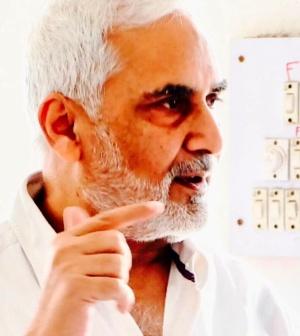
IMAGE: Akramul Jabbar Khan.
Photograph: Akramul Jabbar Khan
A doctor from Aurangabad (now Sambhaji Nagar) pointed out that petitions against the government's proposal to rename Ahmednagar as Ahilyanagar had been filed by local Hindus.
Added Dr Malik, "I interact with a lot of young people. They say they know all this emphasis on Hindu-Muslim differences is politically motivated. If you stop watching TV and turn off social media, you'll find the situation on the ground different."
"I know if I'm in trouble, my Hindu brother will help me."
Feature Presentation: Rajesh Alva/Rediff.com
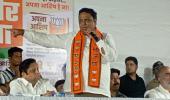
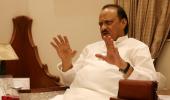

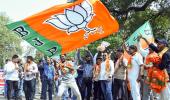
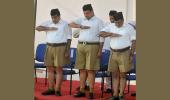



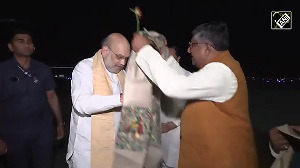

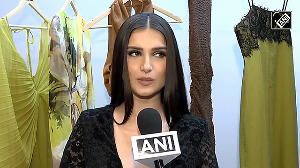
 © 2025
© 2025